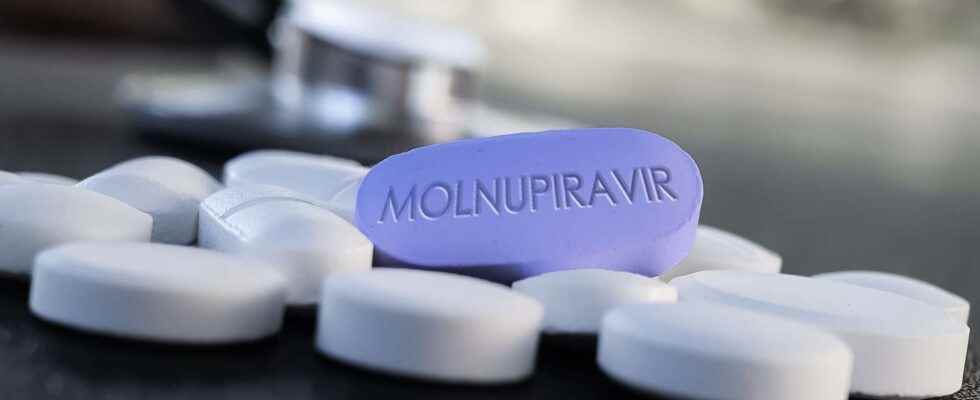The High Authority for Health (HAS) has just pronounced on the use of Molnupiravir to fight against Covid-19. The effectiveness of the Merck pill is called into question by new tests and questions about its harmful effects remain unanswered. Is Molnupiravir still considered an interesting anti-Covid treatment?
You will also be interested
[EN VIDÉO] Are we protected against Covid having been infected? Coronavirus infection induces an acquired immune response. But for how long is it effective against variants?
A few weeks ago the Molnupiravir was at the heart of the news. This antiviral promises to reduce hospitalizations and deaths by approximately 50% when taken a few days after the onset of symptoms from coronavirus. But new tests by Merck, the laboratory that designed Molnupiravir, dampen fervor over use of this treatment curative against the Covid-19. Back to the disappointments of this antiviral.
The changing effectiveness of Molnupiravir
The first dataset shared by Merck, the 1er October 2021, indicates that Molnupiravir reduces the risk of hospitalization and death from Covid-19 by approximately 50% compared to placebo. The 772 participants were treated with two pills per day for five days, upon onset of mild symptoms of the disease. There were 28 deaths or hospitalizations (out of 385) at 29 days in the treated group, against 53 (out of 377) in the placebo group.
November 26, 2021, Merck shares the results of a second test, the conclusions of which are less optimistic. The effectiveness of Molnupiravir against hospitalizations and deaths drops to 30%. This second cohort is made up of 1,433 participants who received the treatment under the same conditions as in the previous trial. Among the patients treated, 48 (out of 709) were hospitalized or died from Covid-19 at 29 days, compared to 68 (out of 699) in the placebo group. The drop in efficacy of Molnupiravir observed during this second trial casts doubt on its real efficacy.
Merck has not yet published this data in a peer-reviewed scientific journal and, according to Nature, the laboratory cannot explain these differences. The supposed causes could be theemergence from Delta variant between the two analyzes or the differences in the management of patients around the world.
An authorization tarnished by concerns
The FDA (US Federal Food and Drug Administration) granted an emergency use authorization for Molnupiravir on November 30, 2021. A decision hotly debated among members of the Antimicrobial Drugs Advisory Committee in charge of rendering its verdict on the efficacy and safety of drugs against infectious diseases. The emergency use authorization was granted by a narrow majority: 13 votes in favor, 10 votes against. Prior to United States clearance, Molnupiravir was approved by the United Kingdom on November 4, 2021, which was then the first country to accept the prescription of this antiviral against Covid.
In the report published following this meeting, available here, the members of the committee note that the cohort which made it possible to study the safety of Molnupiravir is much smaller than that presented for other anti-Covid drugs: 593 people for Molnupiravir against 1,300 to 2,000 people for the authorization of an antibody monoclonal for example. Despite this, no serious side effects have been identified.
The Antimicrobial Medicines Advisory Committee (Antimicrobial Drugs Advisory Committee) also wonders about the consequences of the mode of action of Molnupiravir on the SARS-CoV-2 and human cells. It is an antiviral drug that works by inducing fatal mutations in the genetic material of SARS-CoV-2. Theoretically, a metabolite of Molnupiravir, N4-hydroxycytidine or NHC, could be incorporated into DNA cell and cause mutations. The power mutagen Molnupiravir has been confirmed in vitro, on bacterial cultures, but the tests in vivo, carried out on rats, are negative.
In contrast, Molnupiravir appears to be toxic toembryo and induces malformations in the development of bones and cartilage young rats. Therefore, Molnupiravir is not recommended for pregnant or breastfeeding women and children. For these populations, the benefit-risk balance is not favorable.
Due to its mode of action, Molnupiravir increases the rate of mutation of SARS-CoV-2. While most mutations are ineffective or lethal, others could give the coronavirus a selective advantage. Not surprisingly, the SARS-CoV-2 strains isolated from people treated with Molnupiravir show a high mutation rate, especially in the protein S. There is no evidence that these treatment mutations alter the biology of the virus or the severity of the disease in the affected patients. The consequences of these observations remain difficult to apprehend at the scale of a population.
These are all elements that made the decision of the Antimicrobial Drugs Advisory Committee difficult. He nevertheless ruled in favor of the use of Molnupiravir for adults at risk of Severe Covid-19 in whom infection is confirmed and symptoms mild.
No Molnupiravir in France
In France, the Haute Autorité de santé (HAS) has also spoken out about Molnupiravir. In a notice of December 10, 2021, it is against the early use of this treatment to treat mild forms of Covid-19 in adults. The HAS estimates that a patient treated with Molnupiravir would then be deprived of a more effective treatment, such as the Ronaprève. According to Numerama, the 50,000 doses of Molnupiravir pre-ordered by the French government will simply not be delivered.
What will happen to Molnupiravir? Its principle of action remains interesting because it is effective regardless of the SARS-CoV-2 variant in circulation. Rather than alone, it could be administered as a cocktail with other antivirals, like Pfizer’s Paxlovid for example. Clinical trials should be launched soon to estimate the benefits of this approach.
Interested in what you just read?
.
fs6
